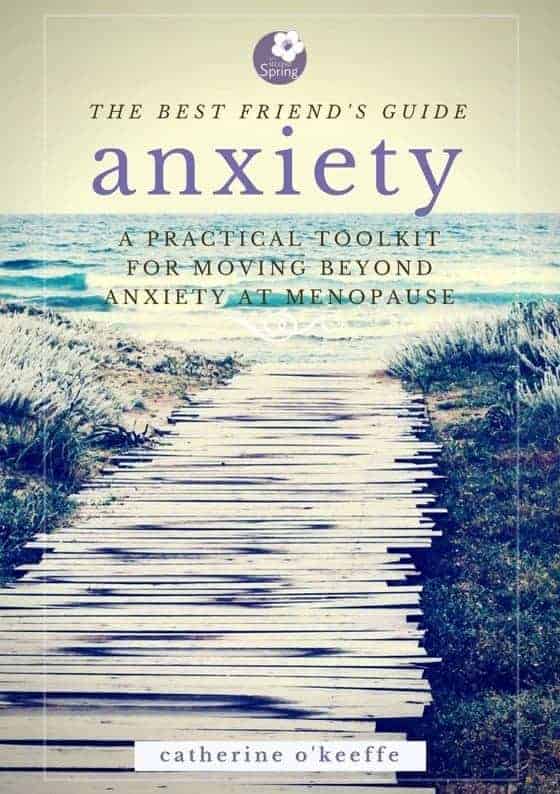Perimenopause and Anxiety.
The period leading up to menopause, known as perimenopause, is often characterised by a series of symptoms which can affect women to varying degrees. These symptoms are caused by sudden fluctuations in hormone levels in your...

The period leading up to menopause, known as perimenopause, is often characterised by a series of symptoms which can affect women to varying degrees. These symptoms are caused by sudden fluctuations in hormone levels in your body and, in particular, the decline of hormones that play a vital role in reproductive health.
During perimenopause, a woman’s body undergoes significant physical and emotional changes, the effects of which can, understandably, contribute to the mental health issues.
How Reproductive Hormones Can Impact Your Mental Health
The main hormones associated with perimenopause are estrogen and progesterone, but it’s important to understand that all hormones in our body are part of an ecosystem, with most hormones influencing or stimulating the production of others.
This is the case for estrogen and progesterone. They aren’t simply hormones that govern the reproductive system, there are estrogen and progesterone receptors throughout your body. When levels of these hormones start to decline sharply during perimenopause, every system that houses any receptors, including your brain, registers these changes.
As the hormone receptors in your brain start to dip, this disrupts the delicate chain of biochemical activity, which, in turn, impacts the production of mood-regulating hormones, like serotonin and dopamine. Accordingly, you may experience changes in your mental health, with an increase in symptoms of anxiety during perimenopause.
Hot Flashes and Night Sweats
Research has found there could be a significant link between perimenopausal hot flashes and anxiety. Not only can experiencing a hot flash at an inappropriate time be stressful, but there is also evidence that suggests that anxiety can increase the risk of hot flashes.

Panic Attacks
This may be a totally new feeling and experience for you or if you have previously suffered from depression or anxiety, it may be exacerbated by the journey into perimenopause and finally actual menopause.

Sometimes the feelings that precede a hot flush can imitate or trigger a panic attack. The symptoms of a panic attack include chest pain, dizziness, heart palpitations, shortness of breath and feeling ‘disconnected’ from reality, and many women report similar feelings before a hot flash.
It’s important to note that while it can be normal to experience symptoms of anxiety — such as irritability, nervousness or tension, feeling fearful for no reason, and a racing heart — during the perimenopause, but that frequent high anxiety or panic attacks can be a sign of something more serious, and should be addressed by a medical professional.
Perimenopause Anxiety in the Morning
Experiencing anxiety in the morning is another common symptom of perimenopause. Generally speaking, levels of cortisol, your stress hormone, are higher in the morning to rouse you from sleep. Before the perimenopause, estrogen helped to control this spike in cortisol.
As you enter into perimenopause, however, lower levels of estrogen mean that there is more cortisol to overwhelm your nervous system in the morning. This surge in cortisol explains why you may feel more anxious as soon as you wake up.
How Long Does Perimenopause Anxiety Last?
Most perimenopausal symptoms last around four years on average, but this can differ from woman to woman. The symptoms will pass, however, as your hormone levels rebalance themselves.
It’s important to acknowledge that perimenopause is a time of significant changes, both to your body and your life, so it’s normal to feel out of control. You may find your behaviour changes during this time, but remind yourself you are OK, and this is a natural reaction to hormonal fluctuations and challenging symptoms.
Perimenopause and Sleep

When hot flashes occur at night, they are referred to as night sweats. Night sweats often lead to fragmented sleep and next-day fatigue. Before a hot flash, your body temperature rises and, consequently, wakes you up. Most hot flashes last around three minutes, resulting in decreased overall sleep efficiency.
But quality sleep is essential for emotional stability. Inadequate rest can pave the way for anxiety and vice versa. Together, anxiety and sleeplessness intensify the effects of each other, creating a negative feedback loop.
According to the sleep expert, Matthew Walker, the brain reverts to its primitive pattern of uncontrolled reactivity when sleep-deprived, which explains why anxiety is more likely after a night of broken sleep.
Listed below is a range of symptoms, which may be associated with menopause. You may find yourself experiencing some of these symptoms for the first time in your mid-late 40s. Mood changes, anxiety and general feelings of nervousness are some of the most common symptoms of menopause and can be even more undermining than hot flashes or night sweats. These symptoms are often exacerbated by insomnia and fatigue. Loads of fun isn’t it?!
- Mood swings
- Irritability
- Anxiety – everything worries you: your children, parents, partner – the world at large.
- Difficulty coping – small things can feel overwhelming.
- Anxiety about your health
- Social anxiety – not wanting to be with other people
- Panic attacks – often at awful times like on the motorway
- Sudden unexplained fears or phobias
- Confusion – your brain seems to jump at times
- Feelings of helplessness – I can’t do this!
- A lack of confidence – everyone else seems to be coping so much better. Have they noticed that I’m not?
- Feeling invisible – I used to turn the odd head but not today!
- Depression

While menopause and its associated symptoms can be difficult to navigate, understanding what’s happening is a big step in being able to manage this period of your life effectively.
Some thoughts:
Use relaxation techniques: meditation, yin yoga, deep belly breathing, and regular exercise are helpful ways to relax your nervous system and offset anxiety. Make relaxation a non-negotiable part of your daily life.
Minimise morning stress: try exercising first thing in the morning to burn off excess cortisol. Avoid having any caffeine as this may intensify anxiety.
Consider supplementation: St. John’s Wort, magnesium glycinate and theanine & lemon balm are known to contribute to normal psychological function and support the reduction of anxiety. Valerian is traditionally used for the relief of night-time disturbances and may aid sleep.
Get help if you need it: don’t be afraid to seek out support if anxiety and panic become too challenging. Talking to your GP or finding a suitable therapist can be a helpful place to start.
Talk to Others. Sharing your feelings and emotions is often the best way to discover that many others are actually feeling the same way. It’s easy to think you are slowly going mad or getting early dementia. Bringing up the subject can be hard and make you feel very vulnerable if you feel you’re the only one not coping. You’ll be surprised how many women are relieved to share this conversation. You can help each other to get to the root of your anxieties by talking.
Me -Time So much of our energy is devoted to what’s going on around us be that work, family or caring for others. It is very necessary to take time-out for yourself. Take even 10 minutes each day when you escape to your bedroom, or the garden and hide from the world: relax, reflect or keep a journal. Try to work this up to longer stretches and then half days and then short breaks away with friends. It’s key to staying social, interested and interesting. So many women prioritise others for so long that they forget how themselves. Here’s your permission to look after yourself. Believe me, everyone will benefit.
Monitor Your Diet. How many cups of coffee or caffeinated drinks are you drinking every day? Try cutting back to see if caffeine triggers your anxiety and nervousness. Have a blood test to see if you need to add any supplements to your diet. For example, you may be short of Magnesium – nature’s tranquiliser, or B Vitamins that give you energy. Certain foods contain natural ingredients that might provide relief for your symptoms. Herbal tea, such as chamomile, is known for its calming properties. Oatmeal has a calming effect on the nervous system.
Check Your Alcohol Intake. Alcohol is a depressant and we can often use it as a crutch to lessen our feelings of anxiety, thereby exacerbating the problem.
Keep Social. As we age our social circle can shrink and this in itself can heighten anxiety, it is imperative to say yes to all social invites, to keep a broad circle of friends and to seek new friends when the opportunity arises. The most important preventative or help for anxiety is to keep social – if you take one tip away from reading this let that be it. You know that 30 minutes of exercise you’re doing every day? Some of it should be with others – what’s not to like about a walk and a chat. Developing new friendships around activity is less pressurised than sitting facing each other one-to-one over coffee or tea. etc.
Educate Yourself. As the saying goes – ‘knowledge is power’. Learn more about your symptoms so that you can make wise decisions about what’s best for your mind and body. Keeping a journal can provide great insights into what we are really thinking and feeling. This may help you to discover whether psychological factors may be contributing to your physical symptoms.
Try to Resolve Past Issues. As you begin the journey into menopause, start to think about your life. Recognise the issues and challenges that really have made you stronger and start to come to terms with past injustices or losses. It is time for forgiveness, healing, and compassion. It can help reduce anxiety and improve your mental health. As Perimenopause comes to a close, and it will eventually, arriving in Menopause seems to bring a new found wisdom to so many of us. It is not the end of your life it is a new beginning. Move forward with the rest of your life as you would like to live it.
Trish Green DiHom(Pract)
Thank you to Olivia Salter: Avid Health nut and Nutritionist: Reference below for her work.
- Bromberger JT. et al., Does risk for anxiety increase during the menopausal transition? Study of women’s health across the nation. Menopause. 2013;20:488-495.
- Freeman. EW., Sammel MD., Anxiety as a risk factor for menopausal hot flashes: evidence from the Penn Ovarian Aging cohort. Menopause. 2016;23:942-949.
- Hanisch LJ. et al., Hot flashes and panic attacks: a comparison of symptomatology, neurobiology, treatment, and a role for cognition. Psychol Bull. 2008;134:247-269.
- Juang K-D. et al., Hot flashes are associated with psychological symptoms of anxiety and depression in peri- and post- but not premenopausal women. Maturitas. 2005;52:119-126.
- Connell, M. (2019). Why We Sleep by Matthew Walker review – how more sleep can save your life. Available online: https://www.theguardian.com/books/2017/sep/21/why-we-sleep-by-matthew-walker-.
AND

Written By Trish Green DiHom(Pract) B.Ed Cidesco Diplomat. Bach Flower Therapist.
Trish is a graduate of the Victoria University of Manchester, Trish is a teacher with 35 years of experience in the education field. For twenty of those years she has been an educator in the esthetics industry. She is an advocate for raising standards in education for Complementary Health Care Practitioners with special interest in Aromatherapy. Her career in the field of natural health and esthetics is wide and varied. From Doctor of Homeopathy to Cidesco diplomat, Trish is a dedicated professional, committed to ongoing education and the education of others.

